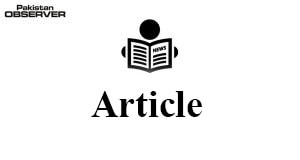Internet access is a basic human right
FROM the basic applications to most advanced ‘Artificial Intelligence’ enabled automated mechanisms, internet is everywhere now and has become a significant factor of human evolution overall.
Accompanied by the Cloud computing systems and the arrival of 5G technology, we can only theoretically perceive the future of our societies.
Like any futuristic sci-fi movie, we will witness driverless vehicles, smart and fully integrated cities, and even revolutionary upgrades in medical, scientific, warfare and educational delivery systems.
Along these lines, we can say that Internet has become important for every individual living in today’s world and Pakistan certainly needs to focus on getting up to speed with the rest of the world.
It was just a few years back, when United Nations (UN) under the Human Rights Council on the promotion and protection of freedom of expression on the Internet, indicated in a 2012 report that the Internet is a medium from which the exercise of Human Rights is derived.
It was stated that the internet is an indispensable instrument for the population to receive information that previously arrived in analog form.
This means that it is not only about information, but that the internet allows all users to be sources of information and have spaces to exchange ideas.
The objective is that countries can no longer exercise control by claiming a monopoly on information and Information Communication Technologies (ICTs).
New challenges kept on appearing such as the dissemination and incitement of cyberbullying, in which case, countries are supposed to repress these behaviors with the same laws as in the printed or traditional mass media. Restricting access to online content is only supported to effectively address genuine concerns.
In this sense, restrictions on the right to freedom of expression on the Internet should be the exception and kept in strict accordance with the international standards and law.
Accordingly, content could not be improperly filtered, blocked, or censored, except in cases where other fundamental rights are violated.
The recent pandemic is also another example where having internet access meant that the individual is further informed and able to survive the pandemic more securely.
Before the pandemic was claiming lives, the significance of the internet kept on ascending.
Even in Pakistan, the fact that internet providing companies such as PTCL, Ufone, Zong, Telenor & Jazz were offering broadband services to the length and breadth of the country, the pandemic showed that Pakistan still had a long way to go.
The divide of internet access in Pakistan was known before as well, however, the pandemic gave the industry leaders a clear picture on where they need to focus more effort to guarantee everyone withaccess to seamless internet.
Pakistan’s urban areas, especially the metropolitan cities enjoy a fast and credible internet service.
Nevertheless, the rural areas of Pakistan are still somewhat behind with the internet access as compared to their city-dwelling counterparts.
PTCL, however, has made an effort in recent past to provide internet and broadband services to lesser developed areas of Sindh.
It’s a laudable step and it is expected that other ICT providers should follow this example and connect remote areas of Pakistan parallel to the developed ones.
As the world moves on to 5G, we must make sure that every Pakistani has access to a high-quality internet service so they could contribute more to the economy, social inclusion, technological advancements, and even live a more comfortable and fulfilling life.
—The writer, a UK national, is a senior journalist currently based in Islamabad.










